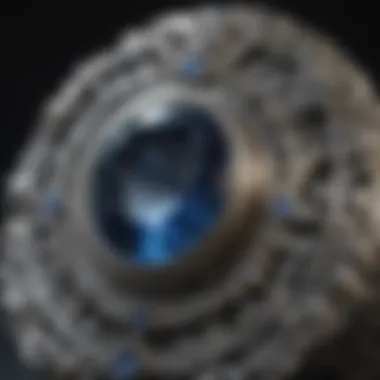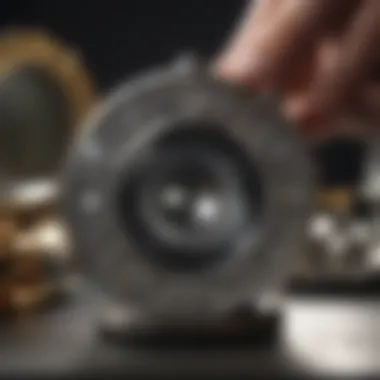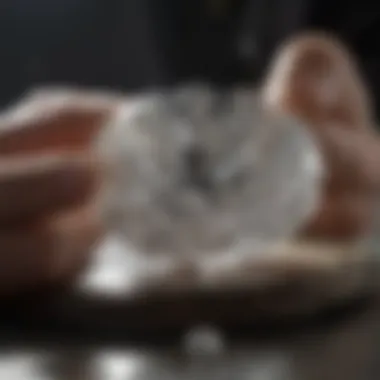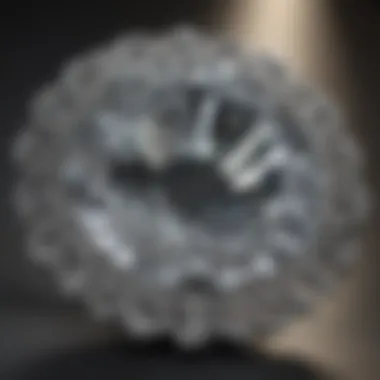Unlock the Brilliance: Mastering the Art of Cleaning Heavily Tarnished Silver


Overview of Silver Tarnishing
Silver tarnishing is a natural process that occurs when silver items are exposed to air containing sulfur compounds. This chemical reaction leads to the formation of silver sulfide, a dark substance that can heavily tarnish silver pieces. Understanding the intricacies of this process is crucial for effectively cleaning heavily tarnished silver and restoring its shine and elegance.
Chemical Reaction Behind Tarnishing
When silver comes into contact with hydrogen sulfide in the air or sulfur-containing compounds from various sources, such as industrial pollution, foods like eggs, and rubber materials or certain fabrics, a chemical reaction occurs. This reaction results in the formation of silver sulfide on the surface of the silver, giving it a dark and tarnished appearance.
Impact of Tarnishing on Silver Items
Heavily tarnished silver items not only lose their aesthetic appeal but can also suffer from corrosion and damage if left untreated. The tarnish layer can etch into the silver, causing pits and irreversible damage. Therefore, prompt and appropriate cleaning methods are essential to preserve the quality and longevity of silver pieces.
Effective Cleaning Methods
To restore heavily tarnished silver, various cleaning methods can be employed. From traditional silver polishes to natural homemade remedies involving ingredients like baking soda and aluminum foil, there are multiple approaches to consider. Each method has its advantages and considerations, depending on the level of tarnish and the silver item's delicate nature.
Polishing Techniques and Tools
Polishing heavily tarnished silver requires meticulous care and attention to detail. Soft, non-abrasive cloths, gentle polishing compounds, and proper technique are essential for achieving optimal results without causing damage to the silver surface. Understanding the correct way to polish silver intricately is paramount for preserving its luster and integrity.
Reviewing the Cleaning Progress
After employing cleaning methods, it's vital to assess the effectiveness of the process and determine if further cleaning or restoration is necessary. Inspecting the silver item under adequate lighting can reveal any remaining tarnish or missed spots that require additional attention. This meticulous review ensures a thorough cleaning process and a gleaming result.
Final Steps and Maintenance
Once heavily tarnished silver items have been successfully cleaned and restored, proper maintenance is crucial for preventing future tarnishing. Adequate storage in anti-tarnish cloth or paper, regular gentle cleaning, and avoiding common tarnish-causing substances can help preserve the shine and elegance of silver pieces for years to come.
Effects of Tarnish on Silver
Dulling of Shine
The dulling of shine resulting from tarnish accumulation directly impacts the visual appeal and aesthetic value of silver objects, detracting from their inherent beauty. The diminishing radiance caused by tarnish tarnishes the overall impression of silverware, prompting the need for proactive cleaning and restoration measures to counteract this outcome. Understanding the implications of shine dulling guides enthusiasts towards tailored cleaning approaches that address this specific effect, ensuring the revivification of silver's captivating luster.
Surface Discoloration


Surface discoloration manifests as a prominent consequence of tarnishing, altering the original hue and sheen of silver articles. The discoloration effects of tarnish introduce unsightly blemishes that mar the flawless surface of silver pieces, necessitating meticulous removal techniques to restore the metal's pristine appearance. Investigating the intricacies of surface discoloration illuminates the nuanced approaches essential for eradicating tarnish-induced stains and reviving the unblemished beauty of silver belongings.
Degradation of Appearance
The gradual degradation of silver's appearance resulting from tarnish compromises the overall aesthetic integrity of precious metal items, diminishing their visual allure and artistic merit. The deteriorating effects of tarnish highlight the imperative nature of consistent maintenance practices in preserving the splendor of silver objects. Unveiling the consequences of appearance degradation underscores the pivotal role of proactive cleaning interventions and preservation strategies to safeguard the beauty and value of silver possessions.
Pre-Cleaning Preparations
In the realm of cleaning heavily tarnished silver items, the preparatory phase holds significant importance. Pre-cleaning preparations form the initial steps that pave the way for a successful restoration process. By meticulously gathering the necessary cleaning supplies and setting up the designated cleaning area, individuals can ensure an efficient and effective cleaning session. Delving into pre-cleaning preparations sets the groundwork for a thorough and meticulous cleaning process. This section acts as a crucial foundation for the subsequent cleaning methods to yield optimal results.
Gathering Cleaning Supplies
Soft Microfiber Cloth
When it comes to delicately handling tarnished silver, a soft microfiber cloth emerges as a crucial tool. The exceptional softness and non-abrasive nature of microfiber cloths make them ideal for gently buffing away tarnish without causing scratches or damages to the silver surface. The smooth and lint-free texture of a microfiber cloth guarantees a streak-free shine, ensuring impeccable results in the cleaning process. Its ability to attract and trap particles and tarnish residue adds to its effectiveness in achieving a pristine finish with minimal effort.
Silver Polish
A staple in silver cleaning, silver polish plays a pivotal role in restoring the brilliance and luster of tarnished silver items. Characterized by its abrasive properties, silver polish effectively removes tarnish buildup and restores the shine to silver surfaces. The chemical composition of silver polish targets tarnish specifically, leaving behind a polished and gleaming finish. While silver polish offers exceptional cleaning capabilities, proper ventilation and cautious handling are essential due to its potentially harsh constituents.
Gentle Soap
Amidst the array of cleaning supplies, the inclusion of gentle soap proves instrumental in ensuring a thorough clean for heavily tarnished silver. Gentle soap, known for its mild and non-abrasive properties, aids in removing dirt, grime, and light tarnish effectively. Its gentle formulation protects the silver surface from potential damage while offering a deep cleanse, preparing the silver for subsequent polishing processes. Ensure to opt for a soap devoid of harsh chemicals or additives to safeguard the integrity of the silver during cleaning.
Soft-bristled Brush
Among the array of cleaning tools, a soft-bristled brush stands out for its ability to access intricate details and crevices on silver items. The soft bristles provide a gentle yet effective means of loosening and removing tarnish from hard-to-reach areas, ensuring a comprehensive clean. When paired with silver polish or gentle soap, a soft-bristled brush aids in dislodging stubborn tarnish without causing scratches or abrasions to the silver surface. Its versatility and precision make it a valuable asset in the cleaning arsenal, especially for intricate silver pieces.
Setting Up Cleaning Area
Well-Ventilated Space
Creating a well-ventilated space for silver cleaning is imperative to facilitate a safe and healthy working environment. Adequate ventilation helps disperse fumes from cleaning agents, such as silver polish, minimizing inhalation risks and promoting air circulation. Prioritizing a well-ventilated area reduces the potential for respiratory discomfort or exposure to chemical vapors during the cleaning process. Ensure windows are open or utilize fans to enhance airflow and maintain a fresh atmosphere while cleaning tarnished silver.
Layered Protection for Surface


To shield underlying surfaces from inadvertent damage during the cleaning process, employing layered protection is essential. Placing a soft towel, microfiber cloth, or protective mat beneath the silver item serves as a safeguard against scratches, abrasions, or chemical spills. This preventive measure ensures that the cleaning area remains pristine and unharmed while concentrating on restoring the luster of tarnished silver items. Opt for soft and cushioned materials to provide adequate cushioning and protection for delicate surfaces.
Ample Lighting
In the realm of intricate silver cleaning, ample lighting plays a crucial role in enhancing visibility and precision during the restoration process. Adequate lighting sources, whether natural or artificial, illuminate the cleaning area, allowing for clear inspection and detailing of tarnished silver surfaces. Proper lighting aids in identifying tarnish buildup, missed spots, and intricate details that require focused cleaning attention. Bright and consistent lighting diminishes shadows and ensures thorough cleaning, contributing to the overall effectiveness of the tarnish removal procedure.
Methods for Cleaning Tarnished Silver
Cleaning tarnished silver is a crucial aspect in restoring its luster and preserving its elegance. This article extensively covers various methods to effectively clean tarnished silver items, providing readers with a comprehensive guide to reviving their cherished pieces. The methods discussed encompass both traditional and natural approaches, offering individuals the flexibility to choose the most suitable technique based on their preferences and silver items' condition.
Polishing with Silver Cleaner
Application Techniques
Application techniques play a vital role in the overall cleaning process of tarnished silver. The method of applying silver cleaner is meticulously detailed to ensure maximum effectiveness in removing tarnish and restoring shine. By following specific application techniques, individuals can achieve thorough cleaning without causing damage to the silver surface. The gentle and precise application of silver cleaner is a popular choice due to its ability to target tarnish effectively while maintaining the silver's integrity.
Polishing Process
The polishing process is a key step in revitalizing tarnished silver items. It involves a systematic approach to buffing the silver surface, enhancing its shine and removing any stubborn tarnish buildup. The technique used in the polishing process focuses on gentle yet firm strokes to avoid scratching the silver while effectively restoring its original luster. This process, when executed correctly, brings out the natural brilliance of silver, leaving it looking radiant and renewed.
Rinsing and Drying
Rinsing and drying silver items post-polishing is essential to complete the cleaning process. Proper rinsing ensures the removal of any residual cleaner or tarnish particles, preventing potential damage or dullness. Drying the silver thoroughly with a soft, clean cloth aids in achieving a pristine finish, free from watermarks or streaks. This meticulous approach to rinsing and drying guarantees that the silver items are impeccably clean and ready to display their newfound shine.
Natural Methods Using Household Items
Baking Soda Paste
Utilizing baking soda paste as a natural cleaning agent offers a chemical-free alternative for polishing tarnished silver. The abrasive yet gentle nature of the paste aids in scrubbing away tarnish effectively without harming the silver's surface. Its environmentally friendly composition makes it a popular choice for individuals seeking natural cleaning methods that are both effective and safe for their silver items.
Toothpaste Method
The toothpaste method involves using regular toothpaste to clean tarnished silver, leveraging its mild abrasive properties to remove tarnish and restore shine. This method is a cost-effective and readily available approach for individuals looking to clean their silver items at home without specialized cleaning products. The gentle abrasiveness of toothpaste ensures the removal of tarnish without causing damage, making it a practical solution for maintaining silver's brilliance.
Lemon Juice and Salt


A mixture of lemon juice and salt forms a potent natural cleaner for tarnished silver, combining the acidic properties of lemon with the abrasive texture of salt. This dynamic duo works synergistically to dissolve tarnish and brighten the silver surface, offering a refreshing and aromatic alternative to chemical cleaners. The natural acidity of lemon juice, coupled with salt's scrubbing action, provides a revitalizing treatment for heavily tarnished silver pieces.
Professional Cleaning Services
Benefits of Professional Cleaning
Opting for professional cleaning services presents numerous benefits for individuals seeking a comprehensive and meticulous approach to cleaning tarnished silver items. Professional cleaners possess expertise and specialized tools to restore silver's shine effectively, addressing even the most stubborn tarnish with precision. The tailored care provided by professionals ensures that silver items are cleaned without compromising their structural integrity, making professional services an ideal choice for valuable or intricate silver pieces.
Considerations Before Opting
Before choosing professional cleaning services, several considerations merit attention to ensure a successful cleaning experience. Factors such as the expertise of the service provider, their cleaning methods, and the cost involved should be carefully evaluated. Additionally, understanding the cleaning process and any potential risks to the silver items is essential in making an informed decision. By assessing these considerations diligently, individuals can confidently opt for professional cleaning services to restore the luster of their treasured silver possessions.
Post-Cleaning Care and Maintenance
Post-cleaning care and maintenance play a pivotal role in preserving the luster and beauty of heavily tarnished silver items. After investing time and effort in cleaning tarnished silver, it is essential to implement proper care strategies to prevent rapid re-tarnishing. Effective post-cleaning care not only prolongs the shine of your silver pieces but also minimises the frequency of deep cleaning sessions, saving time and effort in the long run.
Storage Tips for Preventing Tarnish
Use Anti-Tarnish ClothStorage Bags
The utilization of anti-tarnish cloth or storage bags is a crucial step in safeguarding silver items from tarnishing agents like moisture, sulfur, and air. These specially designed storage materials create a protective barrier around the silver, reducing its exposure to harmful elements. Anti-tarnish cloth effectively absorbs moisture and neutralizes airborne sulfur particles, preventing tarnish formation. Its soft texture and non-abrasive nature ensure that your silver pieces remain unscathed and gleaming for extended periods. The convenience of storage bags allows for compact and secure storage, ideal for both casual and long-term protection of silver items.
Avoid Humid Environments
Humidity is a significant catalyst for tarnish formation on silver. By storing your silver pieces in moisture-free environments, you eliminate one of the primary triggers for tarnishing. Avoid placing silver items in bathrooms, basements, or other damp areas prone to moisture accumulation. Opt for storage locations with controlled humidity levels to maintain the integrity of your silver collection.
Regular Inspection
Frequent inspection of stored silver items is imperative to address early signs of tarnish formation. Regularly check for any discoloration, dullness, or sulfur odors emanating from the silver pieces. Promptly addressing minor tarnishing issues can prevent extensive damage and minimize the need for intensive cleaning procedures in the future.
Periodic Maintenance Practices
Routine Polishing
Regular polishing sessions are essential to uphold the brilliance and shine of your silver items. Routine polishing eliminates surface tarnish and restores the silver's original luster. Choose a gentle silver polish suitable for your specific silver alloy to avoid abrasive damage. Consistent polishing not only maintains the aesthetic appeal of your silver pieces but also forms a protective layer that deters future tarnishing.
Gentle Cleaning After Use
After each use, gently clean your silver items with a soft microfiber cloth or a mild soap solution to remove oils, dirt, and pollutants. This practice prevents the accumulation of harmful residues that can expedite tarnish formation. Avoid harsh chemicals and abrasive materials during cleaning to preserve the sheen and quality of your silver possessions.
Professional Check-ups
Periodic consultations with professional silver cleaners ensure thorough maintenance and early detection of tarnish-related issues. Professional cleanings involve specialized techniques and products designed to address deep-seated tarnish effectively while protecting the silver's integrity. By scheduling regular check-ups with silver cleaning experts, you can prolong the lifespan of your cherished silver articles and sustain their intrinsic allure.







